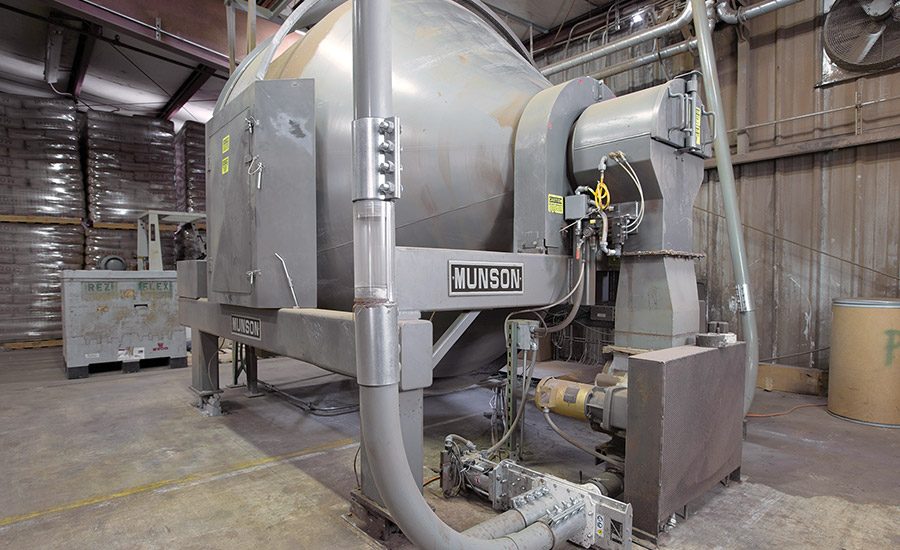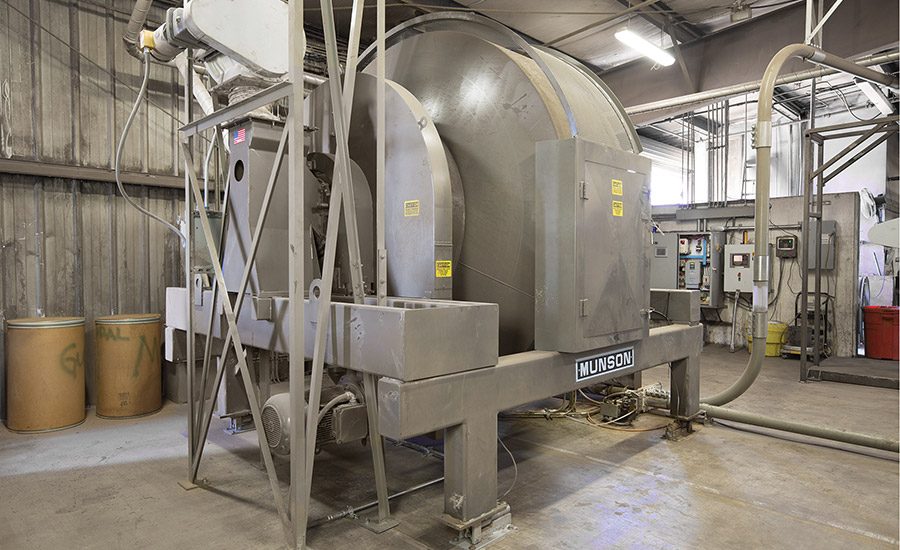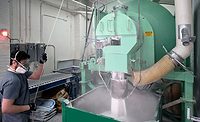Case Study
Rotary Batch Mixer Blends Wood Powders for Plywood Adhesives
A rotary batch mixer tumbles the raw materials for plywood adhesives.










To blend raw material for plywood adhesives at higher rates with greater uniformity, the Willamette Valley Co. replaced a ribbon blender, which agitates material, with a rotary batch mixer, which tumbles it. The company, also known as Wilvaco, mixes fine mesh bark powder from the Western Red Alder tree, along with other wood material, to produce dry blends that it ships to customers who formulate plywood adhesives. Examples of the products blended include Modal SPR-Dark and Modal SPR-Lite, both bulking agents for plywood glue mixes.
High Volume, High Throughput
“We wanted pure blending in high volume,” says Don Coleman, plant manager. “Our glue customers are very particular when it comes to their ingredients, so consistent quality is important. The ribbon blender did not mix materials thoroughly enough. The material, which customers mix in vats in their own formulations, could clog filters and shut down lines if not properly blended.”
The Munson model 700-TH-140-MS at Willamette Valley blends uniformly in about 4 min, with throughput of 6,000 lb (2,721 kg) per batch. The capacity of the previous ribbon blender was one-third of that amount, and was being outpaced by demand.
Continuous Rotation
Coleman says the mixer’s ability to continue rotating during loading and discharging prevents segregation of materials of varying densities, yielding a homogenous blend. Importantly, Willamette Valley is blending wood powder having particle sizes as small as 200 mesh (74 microns)—finer than baking flour—without densification, he says.
The constant rotation also means energy consumption remains stable and relatively low, especially when making multiple batches of one blend. The “soft start” of the motor and slow mixing speed further increase energy savings, he says.
Coleman learned about the rotary batch mixer from the plant manager at Idaho Milling and Grain, a Wilvaco company in Malad, Idaho, that blends wheat flour for glue extenders. Coleman wanted to replace the ribbon blender with a faster, higher throughput machine and his colleague, citing Idaho Milling’s good experience, recommended the rotary batch mixer. Given the mixer’s high output, uniform blend quality and short cycle times, Willamette Valley made the investment.
Material Handling System Feeds Mixer
When tree bark—or “hog fuel” as the industry calls it—is delivered to the Willamette Valley plant, operators run it through a 3,600-RPM grinder for cleaning and size reduction. The moisture content of the bark is 45-60%, so the powder is transported to a dryer, which reduces moisture to 6 or 7%. The bark powder is loaded into a distribution bin and conveyed to one of three PLC-controlled hoppers supplying the mixer.
Each hopper has a capacity of 3,000 lb (1,362 kg) and is mounted on load cells. A rotary air lock at each hopper outlet discharges material into the mixer’s inlet chute. Coleman says an operator selects a recipe on the computer and pushes a “go” button, causing material to discharge from the feed hoppers. A PLC receives weight loss information from load cells and automatically stops the rotary valves once an accurate batch weight has been discharged. As the drum rotates, proprietary mixing flights lift, cut, fold and tumble the material, achieving complete blend uniformity in 1-3 min.
The internal flights also serve to elevate the material for discharge through a pneumatically actuated plug gate valve, leaving no residual other than dust. “Some fine dust may be left on the flights, but this can be vacuumed away when the machine shuts down for material changeover,” Coleman says. A side access door provides access to all interior surfaces for cleaning and inspection.
From the mixer discharge, a pneumatic conveyor transports blends 14 ft (4.3 m) vertically to an overhead weigh hopper equipped with load cells and a rotary valve that allows filling of 50-lb (23-kg) paper sacks or 3,000-lb (1,362-kg) bulk bags under PLC control.
Coleman says 48,000 lb (21,792 kg) of material can be blended in eight hours. “We could do more, but we continually test batch samples and double check our products to ensure consistent quality.” ASI
For more information, phone (315) 797-0090, email info@munsonmachinery.com or visit www.munsonmachinery.com. Willamette Valley Co. can be found online at www.wilvaco.com.
Looking for a reprint of this article?
From high-res PDFs to custom plaques, order your copy today!








